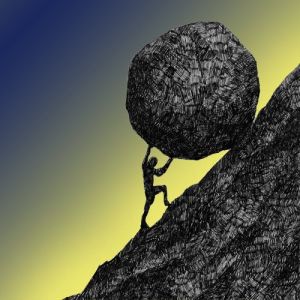Curse of Sisyphus: Difference between revisions
m (→Computer games) |
mNo edit summary |
||
| Line 6: | Line 6: | ||
One key scientific proof of the curse are studies showing that there is a down regulation of pleasure as people gain more income. '''Figure 2''' illustrates this by showing findings of how much people make Vs how much people say they need, year on year<ref>''"The Overspent American" - Professor Juliet Schor, Boston University.''</ref>. The studies<ref>'''Sisyphus in business: Success, failure and the different types of failure'''. Arjan van Rooij Pages 203-223 | Published online: 14 May 2014. Accessed on 24th Sept via: <nowiki>https://www.tandfonline.com/doi/full/10.1080/00076791.2014.909808</nowiki></ref> show that other than a manager promising a bonus, the human mind itself plays tricks on itself to keep it pursuant of a goal. There are engrained [[Neurochemistry|neurochemical]] pathways which have been specifically created for this purpose.[[File:What we make vs what we say we need year on year.png|alt=What we make vs what we say we need year on year|thumb|'''Figure 2'''. What we make vs what we say we need year on year.]] | One key scientific proof of the curse are studies showing that there is a down regulation of pleasure as people gain more income. '''Figure 2''' illustrates this by showing findings of how much people make Vs how much people say they need, year on year<ref>''"The Overspent American" - Professor Juliet Schor, Boston University.''</ref>. The studies<ref>'''Sisyphus in business: Success, failure and the different types of failure'''. Arjan van Rooij Pages 203-223 | Published online: 14 May 2014. Accessed on 24th Sept via: <nowiki>https://www.tandfonline.com/doi/full/10.1080/00076791.2014.909808</nowiki></ref> show that other than a manager promising a bonus, the human mind itself plays tricks on itself to keep it pursuant of a goal. There are engrained [[Neurochemistry|neurochemical]] pathways which have been specifically created for this purpose.[[File:What we make vs what we say we need year on year.png|alt=What we make vs what we say we need year on year|thumb|'''Figure 2'''. What we make vs what we say we need year on year.]] | ||
== Computer games == | == Computer games == | ||
The Curse of Sisyphus is a hall mark of computer game design, to ensure gamers keep gaming, a precise gradient of goal versus rewards is designed ensuring that players feel a sense of accomplishment for their efforts. | |||
=== References === | === References === | ||
Revision as of 02:44, 12 August 2023
The Curse of Sisyphus comes from an ancient Greek tale where Zeus punished Sisyphus for cheating death twice. In the tale, Zeus punishment is that Sisyphus is cursed to roll an immense boulder up a hill only for it to roll down every time it neared the top, repeating this action for eternity (See Figure 1).
The curse exhibits in the real world as the arrival fallacy where people often think their current goal is the only destination on their path. Viktor Frankl wrote, “Happiness cannot be pursued; it must ensue, and it only does so as the unintended side effect of one’s personal dedication to a cause greater than oneself or as the by-product of one’s surrender to a person other than oneself.” Constantly pursuing pleasure and happiness is neither pleasurable nor likely to yield happiness; therefore, the best way to be happy is to forget about trying to be happy and to simply let happiness occur on its own.
One key scientific proof of the curse are studies showing that there is a down regulation of pleasure as people gain more income. Figure 2 illustrates this by showing findings of how much people make Vs how much people say they need, year on year[1]. The studies[2] show that other than a manager promising a bonus, the human mind itself plays tricks on itself to keep it pursuant of a goal. There are engrained neurochemical pathways which have been specifically created for this purpose.
Computer games
The Curse of Sisyphus is a hall mark of computer game design, to ensure gamers keep gaming, a precise gradient of goal versus rewards is designed ensuring that players feel a sense of accomplishment for their efforts.
References
- ↑ "The Overspent American" - Professor Juliet Schor, Boston University.
- ↑ Sisyphus in business: Success, failure and the different types of failure. Arjan van Rooij Pages 203-223 | Published online: 14 May 2014. Accessed on 24th Sept via: https://www.tandfonline.com/doi/full/10.1080/00076791.2014.909808

